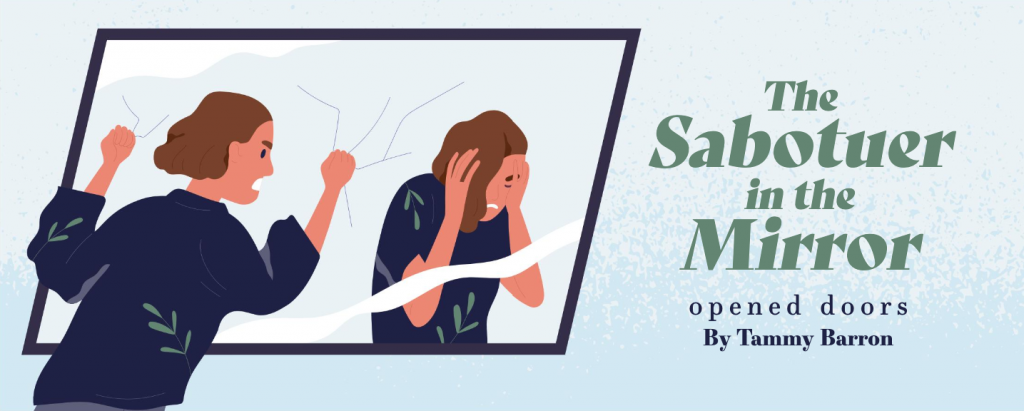
Here I am, staring into the dark void of this three o’clock hour. SLEEPLESSNESS IS ONCE AGAIN MY MASTER. I toss and turn within the sheets and against my internal dialogue, acquainting myself with inner demons I would prefer not to know. It would seem that in this futile state, all of my responsibilities and personal shortcomings become crystal clear and immediately oppressive. A feeling of anxiety begins to creep in, and then I know for certain I will not sleep again this night.
The lies we tell ourselves have significant influence on our perceptions and behaviors. We all do it — tell ourselves untruths to justify the metaphorical masks we wear. The scary part is most of us are unaware we are doing it, and we navigate our bumpy lives through self-sabotaging behaviors.
Procrastination, self-derision, and negativity are just a few that make my list; however, for many, self-sabotage can include disorganization, conflict initiation, and/or overindulgence. Regardless of which lies we choose to spin for ourselves, they can distort the way we look at the world around us and warp our role in it. Unfortunately, most of us have been doing it for so long that we do not recognize the delusion.
Have you found yourself in a frenzy as you start writing a college essay the night before it is due, gleaning insight and motivation only while in full panic-mode? Have you incited an argument to avoid feeling vulnerable or emotionally invested, effectually pushing partners and friends away when you need them most?
Perhaps, on occasion, you seek solace at the bottom of a bag of chips or box of cookies, subsequently packing your bags for a guilt trip on your dashed diet. Whatever the sabotage may be, these behaviors share a common denominator. They create problems in our lives and interfere with our long-standing goals. Self-sabotage creates a level of stress and imposed chaos in our lives unnecessarily.
Why do we torture ourselves this way? In her book Stop Self-Sabotage, Licensed Clinical Neuropsychologist Dr. Judy Ho details the root of the problem: low self-concept, internalized beliefs, fear of change, and excessive need for control, which make up her catchy L.I.F.E. acronym. Low self-concept can shut the door of opportunity in your career as well as personal relationships before you have the chance to engage. Believing you are capable and deserving of success is fundamental.
Otherwise, what would be the point of submitting a resume for that job or asking that special someone to make time for you? Equally important is the way we internalize our role in the world around us. If we are taught at a young age that we are powerless in the face of adversity, our role is to be subservient, or that we are incapable of achievement, these become our truths. This internalized belief could be the most detrimental lie of all.
We live our lives bound within these invisible perimeters, never seeing the mental limitations for what they are. Fear of change can bring the ugly out in all of us. The point is not so much about a lack of imagination, but rather our instinct to avoid failure at all costs. On many levels, failure equates to pain, and we are intrinsically wired to avoid pain — the old fight or flight scenario. Then, of course, we have excessive need for control. Such behavior inevitably leaves one exhausted, isolated, resentful, and self-sabotaged.
A few years ago, I ran into an old friend I had not seen for a while. We spoke for hours about our young families and career challenges. As we caught up with each other’s news, she mentioned her manifestation practices. I will be honest, other than a vague sense of visualization exercises, I was largely unfamiliar with the idea.
Manifestation is the concept that by focusing on what you desire most, you can make it a reality through what you think, say, and do. My friend’s face was alight with providence and pure excitement for a recent job opportunity, which she had been seeking for quite some time. It had me thinking about the power of the mind and wondering: could this be the answer to my bad habits?
The idea that our thoughts, beliefs, and general mindset influence our experience is well documented. In his journals from the Holocaust, Viktor Frankl developed personal testimony to the power of the mind, the endurance of the human spirit, and the true nature of manifestation. He details his work in the field of logotherapy in his book Man’s Search for Meaning, simplifying purpose as a keystone to fulfillment and longevity.
So how do I put an end to my self-sabotaging behavior? Can I simply dream the dream that I will no longer procrastinate or stress about unmet deadlines, waking one morning to find out I was really disciplined and timely all along? No. Definitely not. Rather more likely is the approach to manifesting changed behavior through committed action.
Yes, I can wake up and visualize myself writing at this keyboard — but until I actually sit at my computer and type, this column won’t be written. As for my other self-sabotaging behaviors, I must remind myself to think positively; look on the bright side of things…. even when it’s three a.m.









